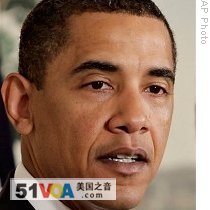White House
13 May 2009
 |
| President Barack Obama, (file photo) |
U.S. President Barack Obama is seeking to block the release of photographs that show American military personnel abusing detainees in Iraq and Afghanistan. The president says he is concerned that releasing the pictures would threaten national security.
President Obama says releasing the photos of abuse at Abu Ghraib and several other prisons could cause a hostile reaction against U.S. troops.
"In fact, the most direct consequence of releasing them, I believe, would be to further inflame anti-American opinion and to put our troops in greater danger," said President Obama. "Moreover, I fear the publication of these photos may only have a chilling effect on future investigations of detainee abuse."
Mr. Obama spoke at the White House Wednesday, shortly after aides made public his decision to fight the release in court.
A civil rights group, the American Civil Liberties Union, filed a lawsuit in 2004 to have the photographs released. It said last month that the Pentagon had agreed to release the pictures by May 28. A statement by ACLU executive director Anthony Romero says the president's reversal "betrays [the U.S.] commitment to transparency and the rule of law."
Senator Joe Lieberman, an independent, says Mr. Obama made the right decision.
"Thank you, President Obama," said Joe Lieberman. "You acted today like a strong commander-in-chief, doing what was in the interest of our country and the men and women who serve us in uniform."
The president says the detainee abuse photos he wants to block from release are "not particularly sensational" but would do no good if publicized.
Mr. Obama says despite the decision to try to keep the pictures under wraps, he will not tolerate the abuse of prisoners.
"Any abuse of detainees is unacceptable," said Mr. Obama. "It is against our values. It endangers our security. It will not be tolerated."
The president spoke before leaving Washington for a two-day trip to the Southwestern U.S.